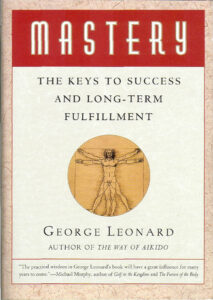
Question More, Action Knowledge.
Remember, at QMAK, we don’t just teach; we empower. We don’t just inform; we inspire. We don’t just question; we act. Become a Gold Member, and let’s unlock your child’s full potential, one question at a time.
 In our previous article, we explored the profound insights of George Leonard’s book, Mastery, and their relevance for homeschooling families seeking to cultivate a love of lifelong learning and personal excellence.
In our previous article, we explored the profound insights of George Leonard’s book, Mastery, and their relevance for homeschooling families seeking to cultivate a love of lifelong learning and personal excellence.
Building upon this foundation, we now delve into practical strategies for nurturing the mindset and habits of mastery in your homeschooler, equipping them with the tools and perspectives necessary to navigate their unique path with patience, dedication, and joy.
One of the central tenets of Leonard’s philosophy is the importance of embracing the learning process itself, rather than fixating solely on goals or outcomes. He emphasizes that the master’s journey is ultimately “goalless,” in that true masters are dedicated to the practice for its own sake, not just for achieving particular objectives. In the words of an ancient Eastern saying Leonard cites: “Before enlightenment, chop wood and carry water. After enlightenment, chop wood and carry water.” The day-to-day practice remains the heart of the journey.
Encourage your child to cultivate a process-oriented mindset, finding joy and satisfaction in the daily efforts of their chosen pursuits. Help them develop a regular routine of focused, deliberate practice, celebrating their commitment and incremental progress rather than evaluating themselves solely based on major milestones achieved. Honor the time on the plateau as much as the spurts of obvious advancement. Create a homeschooling environment that values dedication to the practice itself, seeing challenges and setbacks as opportunities for deeper learning.
Another vital insight Leonard offers is the power of a clear, purposeful vision. While mastery is goalless in the sense of not being dependent on external achievement, it is fueled by an inner vision and intention. Leonard shares how a vivid image of the desired outcome, the “beautiful vision,” creates the initial spark: “All I know, is that the first step is to create the vision, because when you see the vision there—the beautiful vision—that creates the ‘want power.'” Help your child tap into their aspirations, defining a compelling vision that fills them with enthusiasm to practice diligently and persist through difficulties. Encourage them to visualize themselves living out the qualities of character and expressing the abilities they wish to embody.
At the same time, cultivate the skill of holding this vision lightly, with a “soft focus” that allows for detours and unexpected turns in the learning journey. Rigid attachment to a particular path can lead to discouragement when the inevitable challenges arise. Teach your child to maintain a dynamic balance between clear intention and open-ended exploration, as appropriate to their unique learning style and temperament.
Leonard also highlights the productive relationship with mistakes intrinsic to the mastery mindset. In contrast with traditional classrooms that penalize failure, the master’s path embraces errors and deviations as fodder for learning. Leonard describes how the “free operant” of the infant learning to talk – all the babbling, mispronunciations, and halting attempts – is in fact what enables their ultimate mastery. The beginner “has been encouraged to babble, to make ‘mistakes,’ to engage in approximations – in short, to be a fool.” Reclaim the freedom to make mistakes in your homeschooling. Invite your child to take risks, experiment, and even “play the fool” in service of their learning. Frame setbacks as feedback rather than failure. Over time, this mindset builds the deep confidence necessary to persevere and learn from any outcome.
On a practical level, help your child break down their mastery journey into stages: practicing the fundamentals, exploring variations, navigating the plateaus, playing the edge, and expressing their growing skills. Encourage them to seek out the best available mentors and instruction, while taking increasing responsibility for their own learning path. Treat the path itself as an ever-evolving practice, adapting your strategies to your child’s needs and interests.
Remember that your own example speaks volumes. Commit yourself to the master’s journey in some domain, whether related or unrelated to your child’s interests, and let them witness your mindful dedication and your growth. Share your challenges and learning process, not just your successes. Celebrate the profound rewards of following your own path of mastery, inviting your child to savor the same in their journey.
By nurturing the mindset and habits of mastery in your homeschooler, you empower them to approach life with curiosity, dedication and an abiding trust in their own potential for growth. In George Leonard’s words: “Perhaps the best you can hope for on the master’s journey, whether your art be management or marriage, badminton or ballet—is to cultivate the mind and heart from the beginning and at every stage along the way. For the master, surrender means there are no experts. There are only learners.” Let us embrace this endless unfolding together with our children, honoring the master and the fool within us all.

Remember, at QMAK, we don’t just teach; we empower. We don’t just inform; we inspire. We don’t just question; we act. Become a Gold Member, and let’s unlock your child’s full potential, one question at a time.